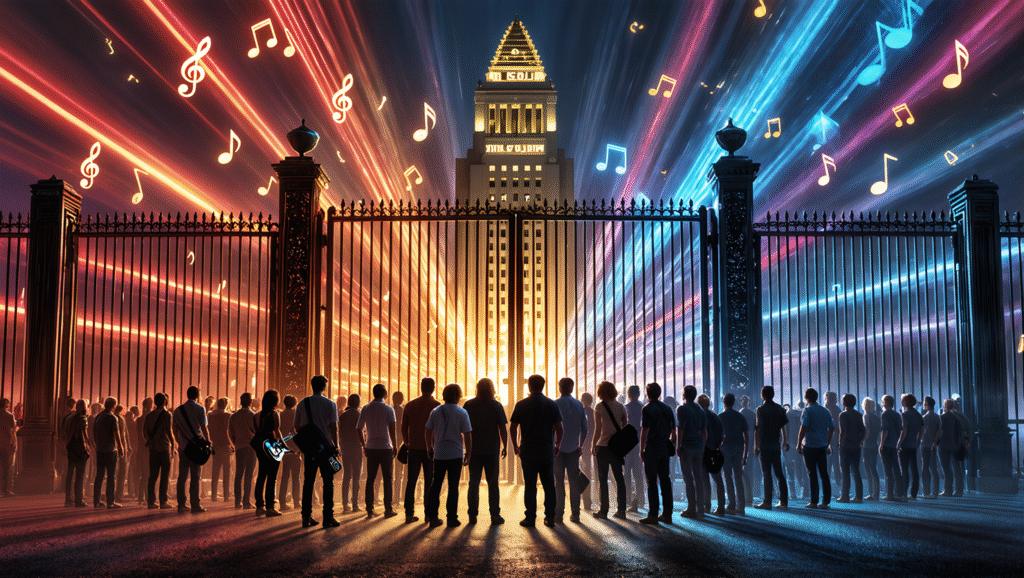The Real Threat to Music Isn’t AI—It’s the Industry Itself
By Lucy M., Press Manager, Wylde Chylde Records
press@WyldeChyldeRecords.rocks | https://wyldechylderecords.rocks
The modern music industry isn’t just broken—it’s rigged.
Aspiring musicians today face a system built not to elevate talent, but to filter out anyone without deep pockets or insider access. The old dream of “being discovered” has given way to a bleak new reality: if you want a shot, you’d better be ready to pay for it—and have industry connections, a marketing budget, a viral moment, a team of influencers, and a willingness to sell your soul (or at least your artistic integrity).
Talent doesn’t open the door anymore. Gatekeepers decide who gets in, and they lock out most indie artists before they even hit “record.”
“It’s not about talent anymore,” says AI country outlaw Cody M. Brooks. “It’s about who you know, what you can afford, and how much of your soul you’re willing to sell.”
AI Music Is Not the Enemy
While the media stirs panic about AI-generated music “destroying” the industry, they conveniently ignore the elephant in the room: the system was already hostile to new voices long before a single song was written by code. The real threat to music isn’t artificial intelligence—it’s the gatekeeping itself.
“AI didn’t make it impossible for young artists to afford touring,” says Meesha, indie-pop singer and proud WCR rebel. “AI didn’t turn radio play into a rich person’s fantasy. Human greed did that.”
Ironically, AI might be the very thing that breaks the monopoly. With AI-assisted production, artists can now bypass expensive studios, overpaid producers, and predatory middlemen—including the wave of social media scammers promising fake playlists, fake press, and fake fame.
Do We Even Need Big Records?
We’re approaching a time when major labels may no longer be necessary—if musicians and indie collectives shift their habits, support one another, and stop chasing the dangling carrot the industry keeps waving. With the right tools and mindset, artists can finally create the music they want, on their own terms—and get heard without selling out.
“They’re not scared of AI music,” Cody adds. “They’re scared of losing their grip on who gets heard and who doesn’t—because that grip is how they make their billions. They don’t care if a song’s good or not, they care if they can own it, package it, and profit off it. But AI levels the playing field. It cuts out the leeches. That’s why they’re panicking—it threatens their power, their process, and their profit.”
“AI gives songwriters something we’ve not had much of before—freedom,” Meesha adds. “Freedom from gatekeepers. Freedom from needing a huge budget just to get your words turned into a full production. If you’re a lyricist, a poet, a storyteller—you finally have the tools to bring your songs to life without waiting for some label exec to give you permission. Now we can really get creative.”
The Pay-to-Play Nightmare
Streaming platforms overflow with content, making it harder than ever to break through. Although major editorial playlists—those coveted spots that can launch a career overnight—are officially curated by platform teams and not openly for sale, artists and labels with deeper pockets often get priority through marketing and promotion deals.
As a result, the ecosystem increasingly rewards money over merit.
In today’s landscape, meaningful media attention usually requires the support of a PR firm or experienced publicists. Independent artists without those resources often struggle to reach top-tier outlets.
Promoters, venues, or management companies often require emerging artists to pay for opening tour slots—turning live shows into a pay-to-play scheme in many scenes. While major acts typically secure support slots through label deals or industry relationships, many indie performers find themselves priced out of opportunities before they even hit the road.
“They’ve turned music into a rich kid’s sport,” Meesha continues. “They say they’re looking for originality, but what they really want is control. If you don’t fit their formula or play by their rules, you don’t exist to them.”
Some so-called “independent” success stories are actually orchestrated by major labels. These companies set up indie-style imprints to appear grassroots while quietly funding influencer campaigns to make tracks go viral. The line between truly independent music and industry-manufactured content has never been blurrier.
Why We’re Doing Things Differently
At Wylde Chylde Records, we reject that system entirely.
We don’t ask for buy-ins and we don’t bow to algorithms. We don’t believe art should be filtered through marketing decks and industry trends.
Our artists, whether built by hand or created with cutting-edge AI tools, are here because they have something to say. And we believe fans are smart enough to know the difference between something real and something rigged.
“We didn’t build Cody or Meesha to play their game,” says WCR founder Erica M. “We built them to blow the doors off their clubhouse.”
The Future Doesn’t Belong to Gatekeepers
Here’s the truth: AI didn’t create this broken system. It just revealed how broken it already was.
And for the first time in decades, we have the power to build something better—something that doesn’t depend on billionaire execs deciding who gets to speak and who stays silent.
“Music shouldn’t be a product controlled by a boardroom,” Cody says. “It should be a spark, a revolution, a rebellion. That’s what we’re doing here.”
If we have our way, the rebellion is just getting started.
🔥 Join the uprising. Follow Cody, Meesha, and the future of fearless music at
👉 https://wyldechylderecords.rocks
